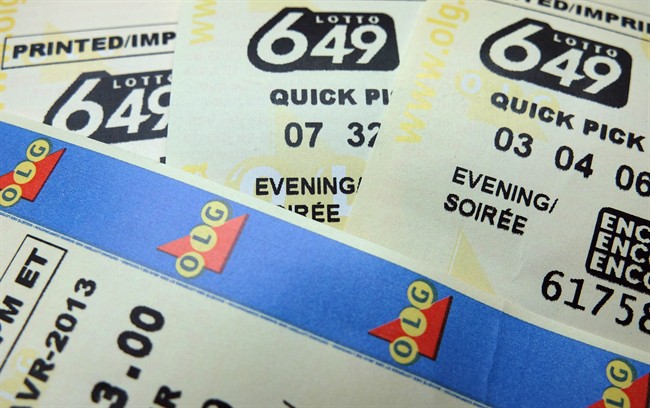One Ontario woman is in a legal battle with her ex-boyfriend after he moved out without telling her and took a $6.1-million winning lottery ticket with him.

Denise Robertson said she and (her now ex-boyfriend) Maurice Thibeault were living together since 2015 in Chatham, Ont., and routinely bought Lotto 6/49 tickets as it was their dream to win big.
“Sometimes he would purchase the tickets and sometimes I would,” she said in a statement released by her lawyers.
She said if they won the lottery, they agreed the money would be theirs as a couple. That didn’t go according to plan.
On Sept. 20, Thibeault bought the lottery ticket that won half the $12-million jackpot, but Robertson said he didn’t tell her.
WATCH: Alberta woman warning others after learning lotto lesson
A day later she heard on the radio there was a winner in Chatham. She then texted Thibeault to check if their ticket was the winner. The released statement shows an excerpt of the couple’s exchange via text.
Robertson: “Did you buy a 649 tix for last night?”
Thibeault: “Yes”
Robertson: “OMG …check it!!!”
Thibeault: “I will need to check my ticket”
Robertson: “12 million—2 winners …Chatham and Quebec”
Thibeault: “That would be nice” “I don’t need all of it” “Just a small piece”
Robertson: “yup …I’ll start planning the floor plan of the house”
Thibeault: “Ok”
Thibeault told her they did not have the winning ticket. And then on Sept. 25, Robertson said he packed up and moved out of their home without telling her.
“When I look back, I recall that he did approximately 15 loads of laundry of all his clothes the night prior, and didn’t put them into the drawers and closets as if he was preparing to pack up and leave,” she said in the statement.
He then quit his job and tried to claim the cash. But Robertson quickly hired lawyers who were able to get a court injunction to freeze the payout until Ontario’s lottery regulator, the OLG, determines the rightful winner.
The lottery ticket is now the focus of a legal battle and is also being vetted by the OLG.
A media representative from the OLG said every winner of a prize over $1,000 must go through a prize claim process. And if there are issues over ownership of the ticket then it will be further investigated.
WATCH: B.C. realtor involved in lottery ticket lawsuit shot in head
What to do if you share a ticket?
There are steps you can take if you’re sharing a lottery ticket and hope to protect yourself, says Toronto-based lawyer Jordan Donich. But it depends whether you’re sharing the ticket with co-workers or a partner.
Splitting a ticket with co-workers can be a bit trickier. The first precautionary step you should take is to sign the ticket, Donich said. “Then it’s abundantly clear who the ticket belongs to,” he added.
If you haven’t signed the ticket, you can also get an arrangement in advance that’s in writing.
Another step is to make sure you’re diligent and check the winning numbers right away. This way if the ticket holder knows he/she has the winning number, you know as well.
“You should also have the person who purchased the ticket email it to you every week so you have a copy,” Donich said. “That action substantiates the fact that you have an interest in it.”
WATCH: Newlywed Alberta couple in their 80s wins big in lottery

Splitting a ticket in a marriage or common-law relationship is a bit different.
“If the couple is married, it’s more likely than not that the other spouse will have a right to half the claim,” he said.
But if it’s between a common-law partner, Donich said, it may be harder to claim your half of the winning prize.
That’s why you should always make sure you have the arrangement in writing. But if you don’t, he said the courts may still side with you.
“If you’re in a common-law relationship, you share things, you split the bills,” he said. “You should not be in a common-law relationship if you are not going to share the proceeds. The law may look at it this way.”




Comments